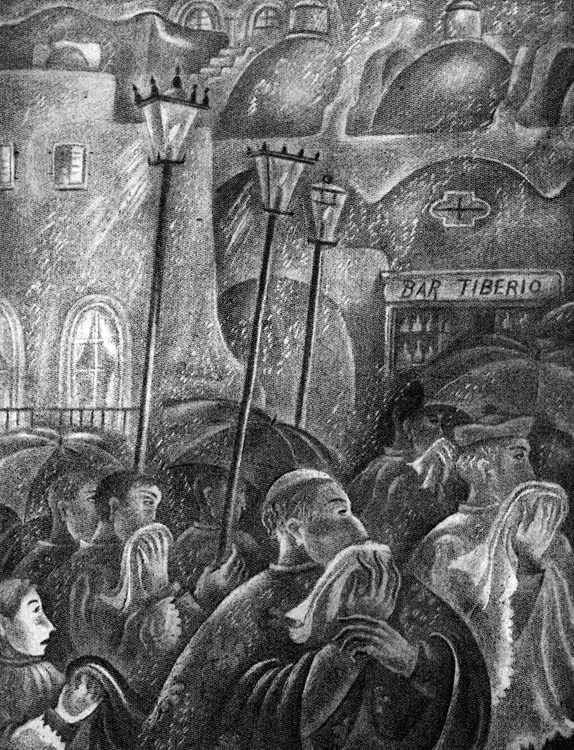The Smell of Adventure

The sense of smell is probably a rather mixed blessing for an adventurer.
A little more than four years ago, Eris Lis, M.D., began writing a series of brilliant and informative posts on RPGs through the eyes of a medical professional. Following is the ninth of them, which appeared here on February 2, 2013.
As I write this, I'm cooking a large pot of onion soup to bring to a friend's for dinner tonight. Preparing the soup requires a certain commitment of time and energy, both of which are often in somewhat short supply in my life, but it's worth it in a number of ways. Aside from the obvious, that I get to eat a tasty soup, it's a recipe that reasonably easily serves a large number of people, so it's a perfect choice for bringing to a dinner. Here's another advantage, though: for several days afterwards, my home is going to smell delightfully of caramelized onion. This wouldn't necessarily be a plus for some people, but I love the smell, as does pretty much everyone in my family ... it must trigger some special dopaminergic circuit in my brain that evolved in my centuries of Russian and Polish ancestors. This very pleasurable side effect of my soup serves to illustrate something we don't always think about in games: the sense of smell.
The sense of smell is probably a rather mixed blessing for an adventurer. On the one hand, it's a very useful tool to those who know how to use it. We've all played and/or played with characters who have abilities like Scent, and we've seen how the added perceptual information can really move a story along. Whether you're tracking prey, recognizing an imposter, or detecting poison in your food, a keen sense of smell is handy to have. On the other hand, adventurers spend a lot of time in rather unpleasant places. When you're traipsing through the sewers of a major metropolis or fighting off rotting zombies, an adventurer is constantly assaulted by all sorts of smells both noxious and nauseating. When I started running my new game a couple of months back, I made a real point of working olfactory information into my scene descriptions, and I was rewarded with my players' very strong reactions, especially to scenes such as searching through an orcish refuse pile. I dare say that their characters would agree: having a strong sense of smell can be both a blessing and a curse.
Of course, everybody knows about blindness and deafness, but what about the loss of the sense of smell? A person who can't detect smells is said to suffer from anosmia, or if an incomplete loss, hyposmia. It can be caused by quite a number of things, including facial trauma -- in which case it often comes back, as the odour sensors in the body are among the few tissues which are capable of real regeneration -- brain damage, certain infections, excessive use of some drugs (notably anything that gets inhaled), and inherited diseases. Of course, temporary anosmia can be caused by something as simple as allergies or the common cold. In a medieval fantasy game, most causes of anosmia can probably be repaired with a Regeneration spell, while some causes might be repairable with Restoration or Remove Disease. But of course, anything that magic can repair, magic can probably cause, and in a world with spells such as Blindness and Deafness, you just know that some mischievous bard or cleric has come up with a spell to permanently remove the sense of olfaction.
Does losing the sense of smell fail to frighten your players? Just wait until the first time they realise that their character can't taste their beer anymore.
Primary ciliary dyskinesia
Also Known As: Kartagener syndrome
This disease is caused by a genetic mutation, and is present from birth. The disease is caused by a malfunction of the "cilia," tiny hair-like structures which play a role in many body systems. Creatures born with the disorder often suffer weakened or absent sense of smell, although some who have the disorder surprisingly seem to actually have stronger sense of smell than average. This is among the least of the problems such a creature suffers, however. The disease also causes reduced mucus in their respiratory system, putting creatures at increased risk of many respiratory lung infections, and many creatures living with the disorder for years eventually require Regeneration spells to repair destroyed lung tissue. In male humanoids, the disease also causes infertility, as cilia-like mechanisms are required for sperm to swim efficiently.
Although lung infections and damage can be healed easily, the disease itself, being genetic, can be cured only with a Wish or Miracle spell.
Dr. Eric Lis is a physician, gamer, and author of the Skirmisher Publishing LLC OGL sourcebook Insults & Injuries, which is also available for the Pathfinder RPG system.






